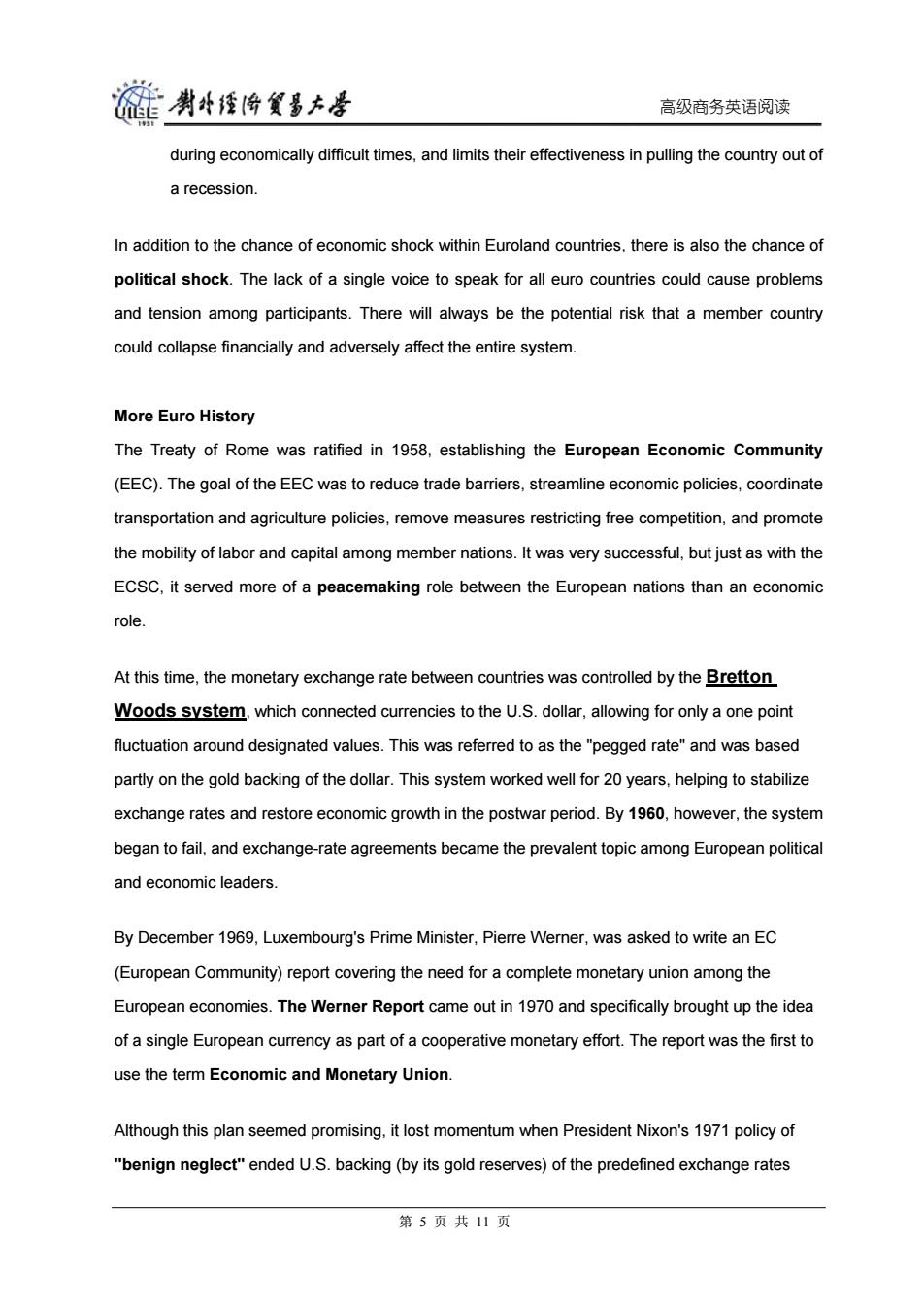正在加载图片...

莲类4睡降发多大号 高级商务英语阅读 during economically difficult times,and limits their effectiveness in pulling the country out of a recession. In addition to the chance of economic shock within Euroland countries,there is also the chance of political shock.The lack of a single voice to speak for all euro countries could cause problems and tension among participants.There will always be the potential risk that a member country could collapse financially and adversely affect the entire system. More Euro History The Treaty of Rome was ratified in 1958,establishing the European Economic Community (EEC).The goal of the EEC was to reduce trade barriers,streamline economic policies,coordinate transportation and agriculture policies,remove measures restricting free competition,and promote the mobility of labor and capital among member nations.It was very successful,but just as with the ECSC,it served more of a peacemaking role between the European nations than an economic role At this time,the monetary exchange rate between countries was controlled by the Bretton Woods system,which connected currencies to the U.S.dollar,allowing for only a one point fluctuation around designated values.This was referred to as the"pegged rate"and was based partly on the gold backing of the dollar.This system worked well for 20 years,helping to stabilize exchange rates and restore economic growth in the postwar period.By 1960,however,the system began to fail,and exchange-rate agreements became the prevalent topic among European political and economic leaders. By December 1969,Luxembourg's Prime Minister,Pierre Werner,was asked to write an EC (European Community)report covering the need for a complete monetary union among the European economies.The Werner Report came out in 1970 and specifically brought up the idea of a single European currency as part of a cooperative monetary effort.The report was the first to use the term Economic and Monetary Union. Although this plan seemed promising,it lost momentum when President Nixon's 1971 policy of "benign neglect"ended U.S.backing(by its gold reserves)of the predefined exchange rates 第5页共11页高级商务英语阅读 during economically difficult times, and limits their effectiveness in pulling the country out of a recession. In addition to the chance of economic shock within Euroland countries, there is also the chance of political shock. The lack of a single voice to speak for all euro countries could cause problems and tension among participants. There will always be the potential risk that a member country could collapse financially and adversely affect the entire system. More Euro History The Treaty of Rome was ratified in 1958, establishing the European Economic Community (EEC). The goal of the EEC was to reduce trade barriers, streamline economic policies, coordinate transportation and agriculture policies, remove measures restricting free competition, and promote the mobility of labor and capital among member nations. It was very successful, but just as with the ECSC, it served more of a peacemaking role between the European nations than an economic role. At this time, the monetary exchange rate between countries was controlled by the Bretton Woods system, which connected currencies to the U.S. dollar, allowing for only a one point fluctuation around designated values. This was referred to as the "pegged rate" and was based partly on the gold backing of the dollar. This system worked well for 20 years, helping to stabilize exchange rates and restore economic growth in the postwar period. By 1960, however, the system began to fail, and exchange-rate agreements became the prevalent topic among European political and economic leaders. By December 1969, Luxembourg's Prime Minister, Pierre Werner, was asked to write an EC (European Community) report covering the need for a complete monetary union among the European economies. The Werner Report came out in 1970 and specifically brought up the idea of a single European currency as part of a cooperative monetary effort. The report was the first to use the term Economic and Monetary Union. Although this plan seemed promising, it lost momentum when President Nixon's 1971 policy of "benign neglect" ended U.S. backing (by its gold reserves) of the predefined exchange rates 第 5 页 共 11 页